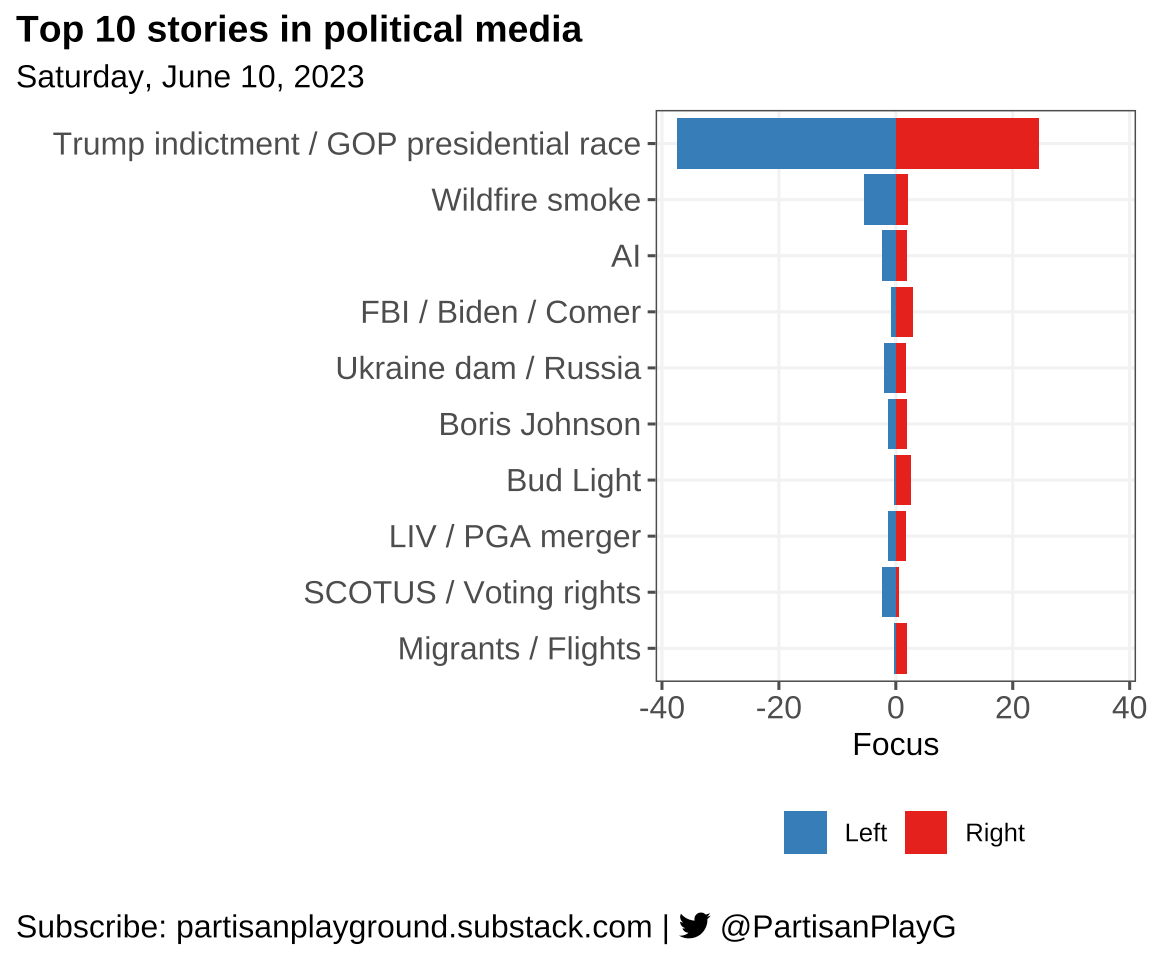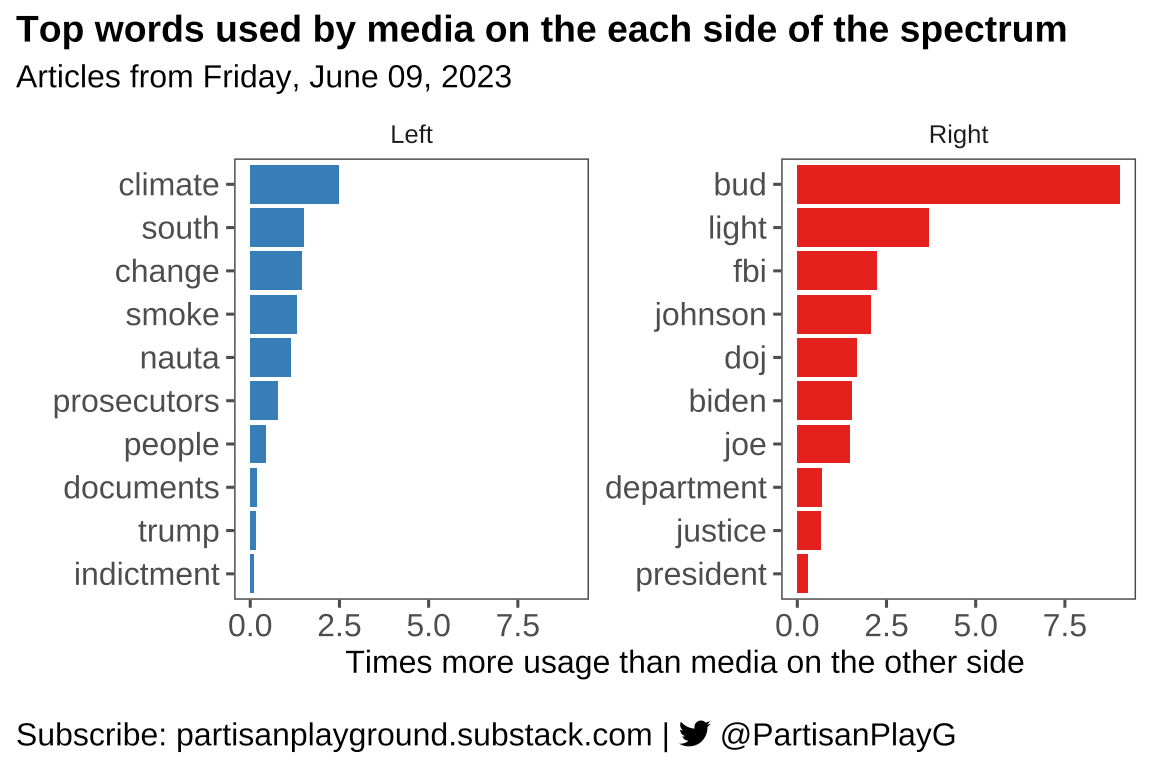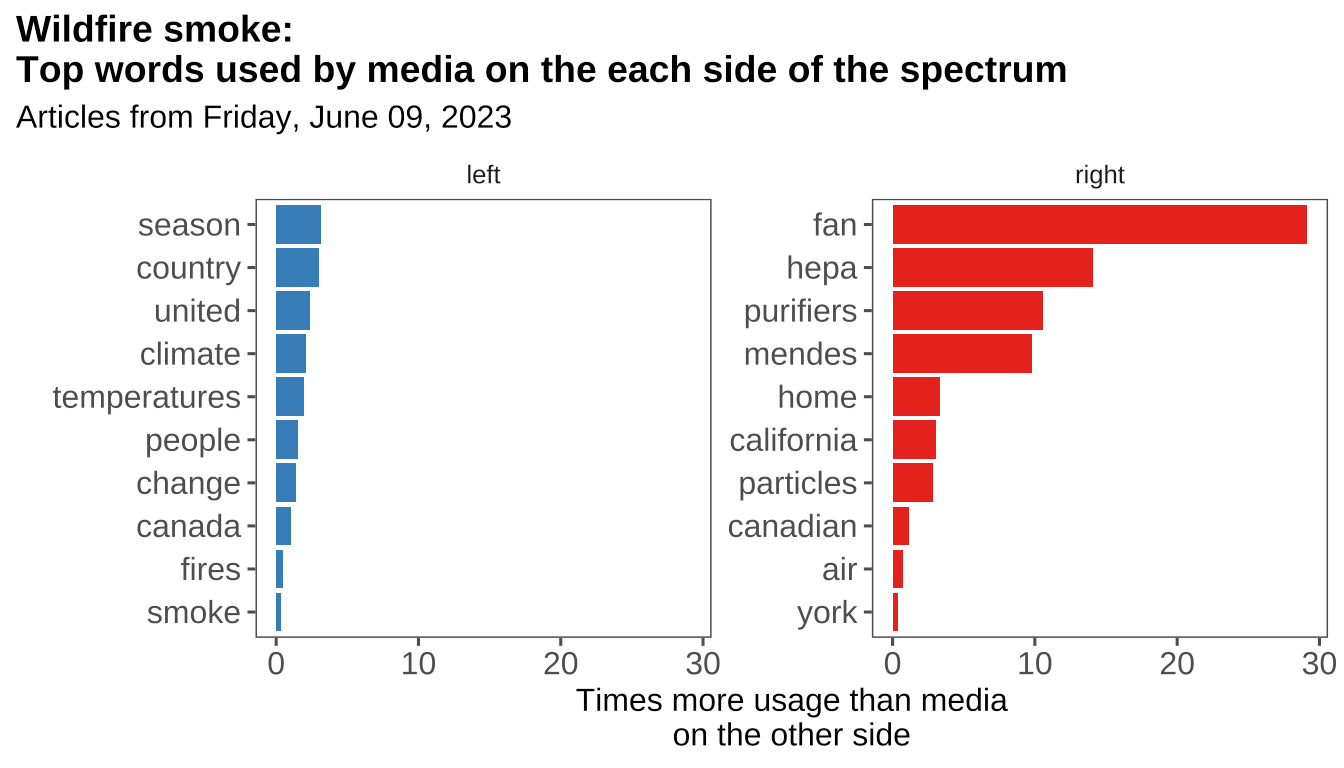Week in review: Saturday, June 10, 2023
What does the news landscape look like?
The Trump indictment ended the week as the biggest news story by far.
This is how the top stories were covered on each side of the media yesterday:
• Trump indictment / GOP presidential race (52% more on the left)
• Wildfire smoke (151% more on the left)
• AI (26% more on the left)
Media bias ratings are from AllSides.
This is how articles from liberal and conservative outlets were distributed over the past five days among the top stories.
Liberal outlets used these words more than conservative outlets:
• climate (2.5x)
• south (1.5x)
• change (1.4x)
Conservative outlets used these words more than liberal outlets:
• bud (9x)
• light (3.7x)
• fbi (2.2x)
What is happening in the top stories?
Now for a deep dive into our top three stories, starting with…
Trump indictment / GOP presidential race
Key people: Donald Trump, Jack Smith, Bill Barr
Latest developments:
Trump is facing federal indictment in the criminal investigation into his handling of classified documents after leaving office, making him the first former U.S. president to be indicted by the DOJ. He is also the front-runner for the 2024 GOP presidential nomination.
Special counsel Jack Smith is leading an investigation into Trump’s handling of classified documents, some of which were discovered in an FBI search of his Mar-a-Lago home after Trump repeatedly refused to turn the documents over to federal officials once he left the White House.
The Department of Justice unsealed the historic indictment on Friday, revealing that the ex-president was being charged with 37 felony counts that grew out of Special Counsel Jack Smith’s investigation of Trump’s post-presidency handling of classified documents.
The former president has repeatedly called the investigation, led by Special Counsel Jack Smith, the “boxes hoax,” insisting that he is innocent.
Former Attorney General Bill Barr pushed back on former President Trump’s claims that the investigation is politically motivated and said he thinks the public eventually will come to realize the former president’s culpability.
Top Democratic leaders are racing to the defense of the Biden administration’s investigations into former President Trump, saying Republicans have overstepped their authority in demanding the release of DOJ documents related to those ongoing probes.
Nearly two-thirds of Americans in a new poll said that former President Trump should not be allowed to serve as president again if he is convicted of a “serious” crime.
Wildfire smoke
Background:
Wildfires have been raging across Canada, with more than 24,000 Canadians forced to flee their homes.
The fires have burned more than 6.7 million acres and forced officials to declare a state of emergency.
The smoke from the fires has been billowing through swathes of the U.S., blocking out the sun and hitting air quality by choking the atmosphere.
Poor air quality can lead to cardiovascular and respiratory issues and may even impact mental health.
Health problems related to wildfire smoke exposure can be as mild as eye and respiratory tract irritation and as serious as worsening of heart and lung disease, including asthma, and even premature death.
Latest developments:
The recent wave of Canadian wildfires has led to large plumes of smoke blanketing New York City, resulting in a massive drop in air quality.
The air quality in NYC skyrocketed over a score of 300 on the EPA’s Air Quality Index (AQI) on June 7 as a result of the smoke.
New York state and some East Coast cities are facing air quality issues because of wildfire smoke from Canada that could result in higher rent prices.
Canadian officials warned on Monday that the country is on pace to see one of its worst wildfire seasons on record from ongoing drought conditions and warming temperatures and for citizens to prepare for a long summer.
The New York State Department of Environmental imposed “Air Quality Health Advisories” for several parts of the state in response to wildfire smoke.
AI
Key people: Sam Altman, Chuck Schumer, Judge Stephen Vaden, Meta Platforms executives
Background:
Open AI CEO Sam Altman has been meeting with lawmakers and national leaders across the globe to discuss the prospects and threats of AI, including a meeting with South Korean President Yoon Suk Yeol to encourage domestic competitiveness in AI.
Senate Majority Leader Chuck Schumer and other senators have scheduled three bipartisan briefings on AI to deepen their expertise on the topic, including a classified briefing on how the Department of Defense and the intelligence community are using AI.
The battle for AI supremacy between the US and China has become the frontline in the global tech race, with China prioritizing becoming the global leader in AI tech development through large public investments and incentives.
Generative AI, such as OpenAI’s ChatGPT, has become increasingly popular and is spurring lawmakers globally to formulate laws to address safety concerns linked to the technology, with the European Union moving ahead with its draft AI Act and South Korea awaiting full parliament approval for new AI regulations.
AI technologies have opened a new frontier in the legal industry, with lawyers and law firms experimenting with the latest tools, but concerns have been raised about protecting confidential client data, avoiding errors, and abiding by legal ethics rules.
Latest developments:
A judge on the US Court of International Trade has issued an order requiring lawyers to disclose their use of generative AI tools to create legal documents, citing security concerns related to confidential information.
Facebook owner Meta Platforms has given employees a sneak peek at a series of AI tools it is building, including ChatGPT-like chatbots planned for Messenger and WhatsApp that could converse using different personas, and Instagram features that could modify user photos via text prompts and create emoji stickers for messaging services.
OpenAI CEO Sam Altman has been meeting with South Korean startups to discuss not stifling innovation and ensuring that any regulatory framework makes sure the benefits of AI technology come to the world.
The European Union is expected to pass its draft AI Act this year, while the United States is leaning toward adapting existing laws for AI rather than creating new legislation.
Meta Platforms has been reorganizing its AI divisions and spending heavily to whip its infrastructure into shape, after determining early last year that it needed to build its own AI tools to compete with rivals like Google, Microsoft, and Snapchat.








